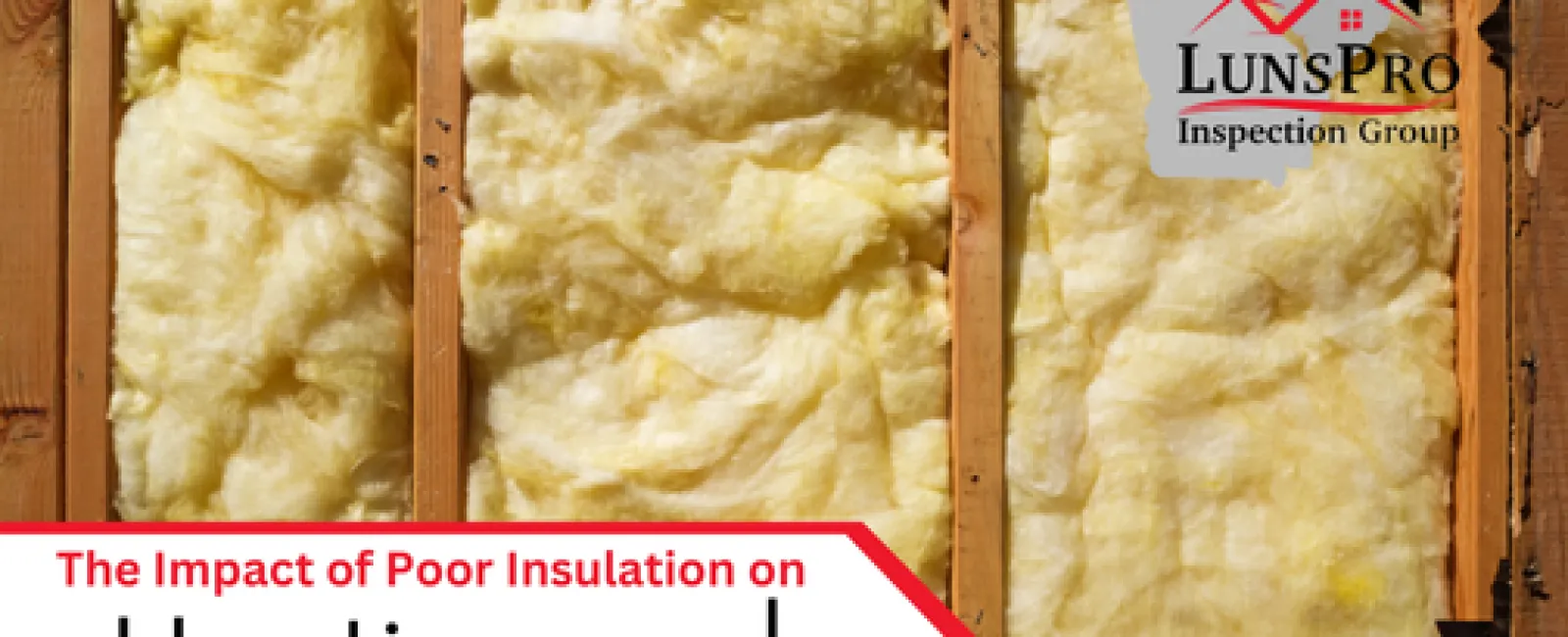Homeowners often overlook the importance of proper insulation, but its impact on heating and cooling costs cannot be overstated. Whether you're living in a hot, humid climate or a region prone to harsh winters, insulation plays a vital role in maintaining a comfortable indoor environment. Beyond comfort, however, is the critical financial aspect: insufficient insulation can significantly drive up your energy bills by forcing your heating and cooling systems to work harder.
For homeowners in Georgia, where the weather can vary dramatically from season to season, ensuring proper insulation is essential. If your home has been suffering from higher-than-expected energy costs, poor insulation could very well be the culprit. An Atlanta, GA home inspector from LunsPro Inspection Group can help assess insulation efficiency during Atlanta residential and commercial home inspections, pinpointing areas for improvement and helping to cut down on heating and cooling expenses.
In this article, we will explore how poor insulation affects energy consumption, what signs to look for in your home, and how an Atlanta home inspector can help you address these issues for long-term savings.
The Importance of Proper Insulation
Proper insulation serves two critical purposes: it keeps the heat out in summer and retains warmth during winter. By minimizing heat transfer between the interior and exterior of a home, insulation helps to regulate indoor temperatures, reducing the strain on your HVAC system.
Energy Efficiency: Inadequate insulation causes heated or cooled air to escape, forcing your heating or cooling systems to work overtime. This increased workload results in higher energy consumption, which directly affects your utility bills. According to the U.S. Department of Energy, up to 30% of energy loss in the average American home can be attributed to poor insulation.
Comfort: Without adequate insulation, certain areas of your home may feel much colder in the winter or hotter in the summer. These uncomfortable zones, known as thermal bridges, can indicate areas where insulation is missing or insufficient. Over time, this imbalance can create an uncomfortable living space that can only be remedied with consistent use of your heating or cooling systems—further driving up costs.
Environmental Impact: Poor insulation not only affects your wallet but also your carbon footprint. When your HVAC system works harder than necessary, it consumes more energy, leading to increased emissions and environmental harm. Making your home more energy-efficient by improving insulation is a sustainable choice that benefits both your finances and the planet.
Signs of Poor Insulation
Identifying poor insulation in your home is not always straightforward, but there are several signs that indicate your home might be inadequately insulated:
High Energy Bills: If your energy bills seem unusually high despite moderate use of heating or cooling systems, this could be a sign of poor insulation.
Uneven Temperature Distribution: When certain rooms are consistently warmer or cooler than others, insulation gaps might be the cause.
Drafts: Feeling drafts or cold air coming through windows or walls is often a sign of insufficient insulation.
Cold Walls, Floors, and Ceilings: If interior surfaces are cold to the touch during winter, it's likely that heat is escaping through these poorly insulated areas.
A Georgia home inspector from LunsPro Inspection Group can thoroughly assess the insulation levels in your home, ensuring that areas such as attics, walls, and basements are properly insulated.
The Role of Inspections in Identifying Insulation Issues
Regular Atlanta home inspections are crucial to maintaining the energy efficiency and comfort of your home. LunsPro Inspection Group provides comprehensive services, including the use of modern tools and techniques like Atlanta drone inspections to examine roof insulation, as well as Atlanta septic and sewer scope inspections that ensure foundational insulation isn't compromised by leaks or moisture issues.
In addition to general home inspections, Atlanta radon testing and Atlanta mold and air quality testing are essential for homeowners to ensure their insulation isn't contributing to harmful environmental factors like mold growth or radon accumulation. Mold, for instance, thrives in poorly insulated areas where condensation can build up, while radon can seep into homes through foundation cracks that may go unnoticed without professional inspections.
How Poor Insulation Affects Specific Systems in Your Home
HVAC Systems: As previously mentioned, poor insulation forces your HVAC system to work harder, significantly reducing its lifespan. Overworked systems are more prone to breakdowns, necessitating frequent repairs or early replacement. By improving insulation, you can extend the life of your HVAC system and enjoy lower maintenance costs over time.
Plumbing: Homes with poor insulation often suffer from frozen pipes in winter, leading to expensive repairs and water damage. Insulating pipes and walls, particularly in colder climates, can prevent these issues.
Roof and Attic: Without proper insulation in the attic, heat rises and escapes through the roof, causing snow to melt unevenly, which can lead to ice dams. This not only increases heating costs but also risks damage to your roof. Atlanta drone inspections can be used to safely and effectively assess attic insulation and identify problem areas without needing to climb onto the roof.
Solutions for Improving Home Insulation
If you suspect your home may have insulation issues, there are several steps you can take to improve its energy efficiency:
Attic Insulation: This is one of the most critical areas in the home to insulate. Many homes lack sufficient attic insulation, and adding more can make a significant difference in both summer and winter energy costs.
Wall Insulation: Insulating your walls, especially if your home is older, can dramatically improve comfort and reduce heating and cooling costs.
Basement and Crawlspace Insulation: Basements and crawlspaces are often neglected, but they are key areas where cold air can enter the home. Insulating these spaces can help prevent drafts and maintain a more stable indoor temperature.
LunsPro Inspection Group offers Atlanta pool inspections, Atlanta mold and air quality testing, and other services to ensure that insulation is not compromised by moisture, mold, or air quality issues. These inspections can help homeowners address insulation issues in a comprehensive, long-term way.
Inadequate insulation is one of the most significant factors contributing to high heating and cooling costs in homes. As energy prices continue to rise, taking steps to properly insulate your home is a smart financial decision. LunsPro Inspection Group and its team of experienced inspectors, including Atlanta, Georgia home inspectors, can help identify problem areas in your home's insulation. Through comprehensive Atlanta residential and commercial home inspections, you can save money on energy bills, extend the lifespan of your HVAC system, and create a more comfortable living environment.
Don't wait until your energy costs spiral out of control.

